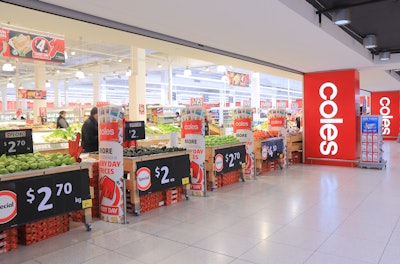
As a fifth outbreak of highly pathogenic avian influenza (HPAI) is confirmed in Australia’s hens, one supermarket chain has introduced a temporary cap on consumer egg purchases. In Europe, the only recently reported infection is in a Finnish wild bird. One young human case in the Western Pacific region is reported to have recovered.
Across much of Australia, shoppers at the Coles supermarket chain have been limited with their egg purchases.
This is the result of a series of HPAI outbreaks affecting five commercial farms so far — all in the southern state of Victoria, according to the Australian Broadcasting Corporation (ABC) earlier this week.
For the time being, Coles’ customers are limited to two egg packs per transaction “in order to maintain availability and support as many customers as possible,” according to in-store signage. The restrictions apply nationwide, with the exception of the state of Western Australia.
So far, no other retailers have placed restrictions on egg sales.
Up to last week, three egg farms in Victoria had been confirmed with outbreaks of HPAI since mid-May.
Since then, two more commercial premises with laying hens have tested positive for HPAI virus, bringing the nation’s total so far to five.
According to ABC, both of these latest outbreaks occurred in the Meredith area, just to the west of the city of Melbourne. Like the previous two outbreaks in this area, presence of the H7N3 virus serotype was confirmed at these farms.
As well as restrictions on the movement of poultry in the area, the source reports that more than 500,000 laying birds have been culled as part of the measures to control the spread of the virus. This amounts to around 6% of the state’s laying hen population, according to the farmers’ federation. Victoria is Australia’s third most important egg-producing state.
Future recovery of the hen population may be impacted by the fact that one of the latest outbreaks involved a premises rearing replacement pullets. This is according to the latest official notification to the World Organisation for Animal Health (WOAH).
At the location of the country’s fifth HPAI outbreak, which began on May 22, almost 152,000 laying hens have been culled after testing positive for a different HPAI virus variant — H7N9. The affected premises was at Terang, which is located further west in the state of Victoria.
In a recent interview, federal Agriculture Minister Murray Watt aimed to calm fears of an imminent nationwide egg shortage.
“If you're looking at it at a national perspective, we have around 21 million to 22 million egg-laying hens in the country. There have been about one million affected and euthanized [due to HPAI], or in the process of being euthanized, which is about four per cent of the overall national flock, if you like, of egg-laying hens. I don’t want to be complacent about this and we do need to act quickly and carefully, but people can be confident that we've got this in hand.
Update on HPAI situation elsewhere in Asia-Pacific, Europe
Within Europe, the only case of HPAI reported to WOAH over the past week was a wild bird in Finland. Affected was a bird of prey found dead in the city of Helsinki in January of this year.
In the Western Pacific region, the World Health Organization has recently recorded a further human infection with the avian influenza A(H5N1) virus. The patient was a girl aged two-and-a-half years who is thought to have picked up the infection while traveling in India in February. She was admitted to hospital in Australia in early March, and discharged later that month.
Following heavy losses from HPAI during the second half of last year, South Africa’s poultry sector is making preparations to resist a repeat of the mortalities and folded businesses in the coming months.
View our continuing coverage of the global avian influenza situation in poultry, and on disease developments in the U.S..


















